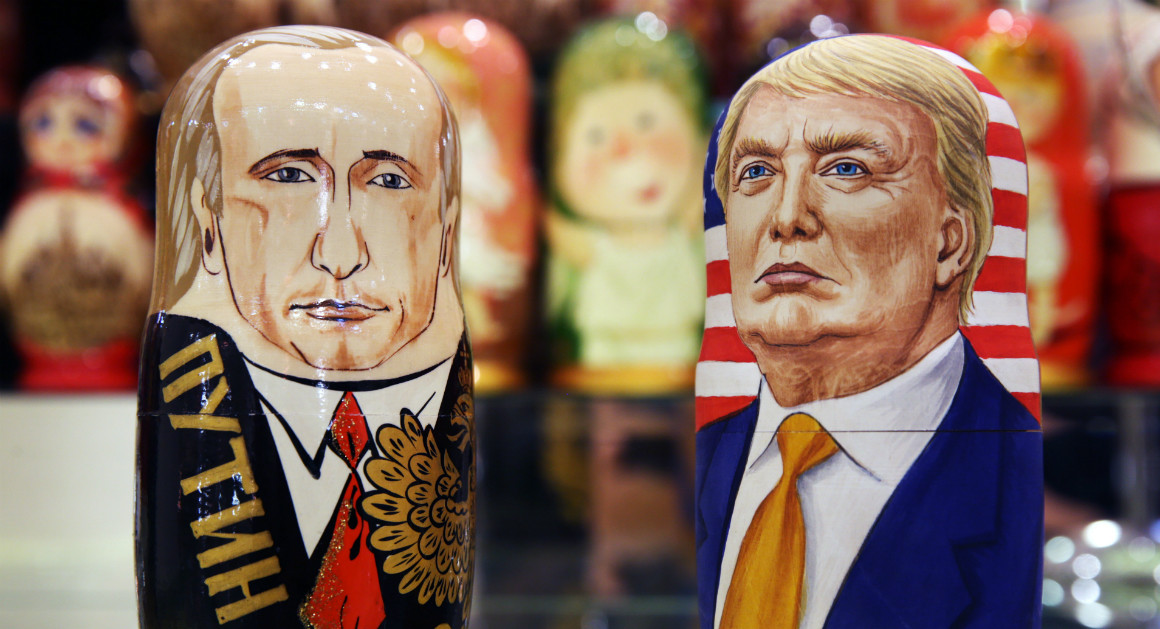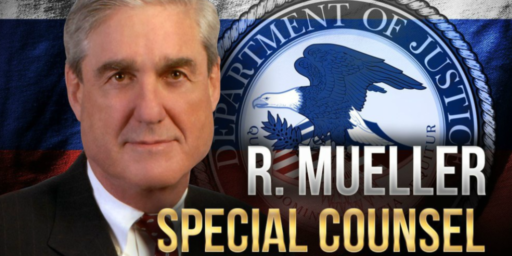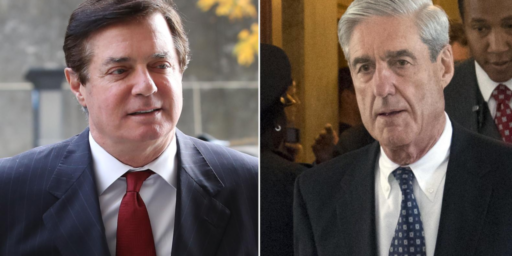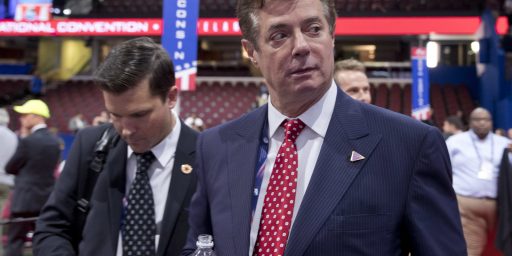Trump Campaign-Russian Intelligence Link Definitively Established
RussiaGate is back in the news but the story is unlikely to move the needle.

Yesterday’s filing of additional financial sanctions against Russia finally connected the last dot between the 2016 campaign of Donald Trump and Russian intelligence. What was actually proven, though, remains unsatisfying. Further, it’s sufficiently complicated that few will even pay attention.
WaPo‘s Philip Bump (“The government finally connects the line from Trump’s campaign to Russian intelligence“):
From the first moments that the report on Russian interference in the 2016 election compiled by former special counsel Robert S. Mueller III’s team became public two years ago, it was obvious where it contained gaps. The report itself documented the places where questions were unhappily left unanswered, a function of reticence from relevant parties or of encrypted communications or, at times, of witnesses being unavailable for interview.
In that latter group was a man named Konstantin Kilimnik.
Kilimnik, who was indicted by Mueller’s team, sat at the center of one of the more obvious places where the campaign of then-candidate Donald Trump might have intersected with Russia’s efforts to get Trump elected. Kilimnik had worked with Trump campaign chairman Paul Manafort for years before Manafort joined the campaign effort despite (or perhaps because of) his sketchy connections to Russia. One of Manafort’s primary clients in the years before his volunteering to work for Trump without pay was a pro-Russian political party in Ukraine. Their mutual colleague Rick Gates told various people that he believed Kilimnik was a “spy,” according to Mueller’s report, but that didn’t keep the three from sharing information during the campaign — while both Gates and Manafort worked directly for Trump.
On Aug. 2, 2016, with Manafort running the Trump campaign and Gates serving as his deputy, the three met at a cigar club in midtown Manhattan. Beforehand, Manafort had asked Gates to print out campaign polling data, information that Manafort apparently gave Kilimnik that evening.
Mueller’s report describes the meeting: “They also discussed the status of the Trump Campaign and Manafort’s strategy for winning Democratic votes in Midwestern states. Months before that meeting, Manafort had caused internal polling data to be shared with Kilimnik, and the sharing continued for some period of time after their August meeting.”
At another point, the report goes into more detail about that ongoing exchange of information. “Manafort instructed Rick Gates, his deputy on the Campaign and a longtime employee, to provide Kilimnik with updates on the Trump Campaign — including internal polling data, although Manafort claims not to recall that specific instruction. Manafort expected Kilimnik to share that information with others in Ukraine and with Deripaska. Gates periodically sent such polling data to Kilimnik during the campaign.”
The “Deripaska” referred to is Russian oligarch Oleg Deripaska, a former client of Manafort’s whom the campaign chairman had been eager to impress with his position on the campaign. (Hours after the Aug. 2 meeting, a plane belonging to Deripaska landed in New Jersey; his team denies any link to the meeting.)
This was as close as Mueller got to demonstrating a connection between Trump’s campaign and the Russian effort to aid his candidacy, an effort that included both a bid to influence public opinion using social media and the release of data stolen from the Democratic Party and a senior staffer for Hillary Clinton, Trump’s 2016 opponent. It left unanswered two questions: How close was Kilimnik to Russian intelligence, and what did he do with the polling information he’d received?
The Mueller report acknowledged both uncertainties, writing that “Because of questions about Manafort’s credibility and our limited ability to gather evidence on what happened to the polling data after it was sent to Kilimnik, the [special counsel’s team] could not assess what Kilimnik (or others he may have given it to) did with it.”
Last year, one of those questions was answered. A bipartisan report from the Senate Intelligence Committee identified Kilimnik explicitly as an agent of the Russian government: “Kilimnik,” it read, “is a Russian intelligence officer.”
At another point, the report brushes up against the second question.
“The Committee obtained some information suggesting Kilimnik may have been connected to the GRU’s hack and leak operation targeting the 2016 U.S. election,” it read. The GRU is the intelligence arm of the Russian military and has been identified as the group that stole the information from the Democratic National Committee and Hillary Clinton’s campaign chairman that was later released by WikiLeaks. The implication, then, is that there was not only a connection between Kilimnik and Russia broadly but specifically to the team directly involved in the interference effort.
On Thursday, the Treasury Department unveiled new sanctions against the Russian government linked to its apparent hack of U.S. government networks. But the news release also included a statement clearly answering our second question above.
“During the 2016 U.S. presidential election campaign, Kilimnik provided the Russian Intelligence Services with sensitive information on polling and campaign strategy. Additionally, Kilimnik sought to promote the narrative that Ukraine, not Russia, had interfered in the 2016 U.S. presidential election,” the statement read.
“Kilimnik has also sought to assist designated former President of Ukraine Viktor Yanukovych. At Yanukovych’s direction, Kilimnik sought to institute a plan that would return Yanukovych to power in Ukraine,” it read.
Yanukovych was a member of the pro-Russian party for which Manafort had worked, the Party of Regions.
That one sentence, though, appears to finally complete the long-speculated line from Trump’s campaign to Russian intelligence. It goes like this, according to the aggregated information compiled by various parts of the government:
*Trump hires Manafort to run his campaign.
*Manafort then orders Gates, his deputy, to provide polling and strategy information to Kilimnik, their longtime colleague and, according to the Senate committee, a Russian intelligence officer.
*Kilimnik then shares that information with Russian intelligence agents.
Got all that?
At NYT (“Biden Administration Says Russian Intelligence Obtained Trump Campaign Data“) Mark Mazzetti and Michael S. Schmidt add:
The Biden administration revealed on Thursday that a business associate of Trump campaign officials in 2016 provided campaign polling data to Russian intelligence services, the strongest evidence to date that Russian spies had penetrated the inner workings of the Trump campaign.
The revelation, made public in a Treasury Department document announcing new sanctions against Russia, established for the first time that private meetings and communications between the campaign officials, Paul Manafort and Rick Gates, and their business associate were a direct pipeline from the campaign to Russian spies at a time when the Kremlin was engaged in a covert effort to sabotage the 2016 presidential election.
Bump rightly points out,
It’s important to note that there is 1) no evidence at this point that Trump knew about the sharing of that information or 2) that Russia did much with the information it obtained. There were targeted ads from Russian actors during the campaign, but there remains no good evidence that those ads were targeted with insider information (much less well-targeted in general) nor that they had much of an effect.
What is instead revealed is that the government’s concern about the Trump campaign’s links to Russia — links that extended to other members of Trump’s team — was in this case probably warranted. Manafort’s presence in the campaign prompted head-scratching from the outset, given his ties to various international ne’er-do-wells. He had been on the radar of federal intelligence agencies for years. It’s not surprising, then, that this link should be demonstrated. It just took awhile for the line to be drawn as clearly as it was Thursday morning.
Mazzetti and Schmidt add:
The Biden administration provided no supporting evidence to bolster the assessment that the Russian intelligence services obtained the polling data and campaign information. And the release shed no light on why Mr. Manafort and Mr. Gates gave polling data to Mr. Kilimnik, although previous government reports have indicated that Mr. Manafort thought Trump campaign strategy information could be a valuable commodity for future business deals with Kremlin-connected oligarchs.
Having the polling data would have allowed Russia to better understand the Trump campaign strategy — including where the campaign was focusing resources — at a time when the Russian government was carrying out its own efforts to undermine Donald J. Trump’s opponent.
And Team Trump is pushing back hard:
Mr. Gates said in a statement on Thursday that the Treasury Department had failed to provide any evidence to back up its claim, adding that “the polling data passed periodically to Kilimnik at Paul Manafort’s direction was simplistic and outdated, never in real time.”
“It was from both public and internal sources,” Mr. Gates said. “It was not massive binders full of demographics or deep research. It was ‘topline’ numbers and did not contain any strategic plans.”
So far removed from the 2016 campaign and with Trump defeated in his re-election bid, this complicated, tenuous connection is unlikely to move the public debate. The subhed of Bump’s piece is “So much for the ‘Russia hoax’ hoax” but it’s noteworthy that Bump himself doesn’t make that leap. Indeed, if anything, one suspects that this will be seen by Trump supporters and Deep State skeptics as yet more evidence of Russiagate as a hoax.





Yeah, trump was a stooge.
This was all a given. No surprises. The Big Question is still: why?
Why would Vladimir Putin and Russian intelligence support Donald Trump? That he did in fact support Trump is beyond reasonable doubt. So why? Because he wished us well and wanted a strong America?
Putin owns Trump. It’s been obvious for five years. Trump was, in effect, a Russian asset. A Russian asset who did terrible damage to this country while openly kissing Putin’s ass.
@Michael j Reynolds: My longstanding theory is that Putin was simply trying to do everything he could to damage Hillary Clinton so that she would be a weakened President. That Trump won was a ridiculous longshot that Putin could never have predicted and only happened because of the vagaries of our electoral system.
It’s infuriating in that…THIS IS NOT NEW!!!!
All of this came out in the Stone trial.
Kudos to Bill Barr for successfully manipulating the entire 4th Estate with fake news about what he claimed was fake news.
The 4th Estate sucks…full stop.
I’m willing to bet good money that you would find that Russia used the polling data to target Michigan, Wisconsin, and PA, with a social media disinformation campaign and that it was, along with Comey violating protocol to harm the Clinton Campaign, enough to account for the 107,000 votes in those three states that won the Electoral College for the former guy.
What did Putin have on Trump? Almost certainly a recording of Trump with a 15 year old escort who looked exactly his daughter or something plus the fact that the Trump existed only to launder money. Regardless, would that have mattered? Putin is not an idiot. He had a good idea that the GOP would have excused what he had as quickly as they excused everything else. I mean the idiots who were doubtful that Trump’s campaign tried to get intel from Russia in 2016 were completely happy to give him a pass when he got caught colluding with the Ukraine to go after the Biden campaign. Nobody cared. Blackmail works on the principle of vice and virtue each coexisting in a person. You couldn’t do that with Trump and the GOP loved him for it.
Look at the excuses: We gave them data but it wasn’t very good. Begs the question why data was provided at all.
Let’s not forget that Manafort and Roger Stone are law firm partners besides being pardoned convicted felons.
I suspect more intelligence will be forthcoming.
@Daryl and his brother Darryl:
If the news media in this country were serious about journalism, the former guy would already be in prison. Instead they are nothing more than stenographers who repeat almost any lie in the interest of pretending to be unbiased.
FACTS, and the TRUTH, don’t have two sides, folks.
@James Joyner:
The devil you know, vs. the devil you don’t, is a much easier choice if you know both devils. Putin knew Trump. His intel people knew Trump. Had they not known Trump, they’d have feared a clearly unstable, loudmouthed hothead with 7000 nukes. They’d have had reason to worry that Trump could win, and that he’d be far more dangerous than Hillary.
If you’re Putin do you decide to infuriate the woman you think is going to win? Or do you enhance the odds of an unstable idiot becoming your main adversary? To me, neither choice would make sense. It would be irrational for me to make Hillary even more determined to screw me. And it would be irrational to risk electing Trump.
Unless of course you knew that Trump was under your control. Then supporting Trump – especially if you thought you wouldn’t be caught – makes perfect sense. In fact, it’s the only way any of this makes sense. Which is why I’ve believed from very early on that Trump is a Russian stooge.
@James Joyner: I would add that anything that helps makes American (and western) democracy look bad bolsters Putin’s claims that what Russia has is not different than what the US and Europe have.
That, by itself, is an extremely powerful incentive.
@Modulo Myself:
Trump’s family has been working for the mob for three generations. The reason Trump was able to stay rich despite so many failing business is because his real career was money laundering. Originally he worked for the Genovesse family, but when the LCN went into decline in the 90s and the Russian mob rushed in to fill the vacuum, he switched to working for them.
Since the KGB was deeply involved in the Russian mob, Putin had access to information about all of Trump’s crimes from the 90s on. That’s what Putin had over Trump.
This latest news adds detail and confirmation, but I’m not hearing anything we didn’t already pretty much know. We knew there was this collusion, to use the imprecise but common word, between the Trump campaign and Russia. Republicans will continue to defend Trump using the straw man that there was no specific deal directly between Trump and Putin. But there was collusion. Maybe low level and buffoonish, but collusion. The Trumpskyites can complain about being spied on, and claim the elusive Durham* report will prove it, but it would have been dereliction of duty by the FBI to not investigate.
* Durham reminds me of a long ago speech by IIRC Nixon’s Surgeon General. He announced they’d been researching the harmful effects of marijuana, and while they had nothing, promised to keep researching until they did. Oh well, maybe another Friedman unit or three.
@James Joyner:
I tend to agree with that, based on the New Coke principle, which states: People are rarely that stupid or that smart.
Putin was trying to hurt Clinton, no question, but neither he nor his intelligence apparatus are omnipotent or omniscient marvels who can manipulate election results at will.
While Putin’s efforts undoubtedly hurt Clinton and helped Trump, we should not overlook the shortcomings in Clinton’s own campaign, Comey’s letter/October Surprise, and other factors involved going back to the GOP primaries and how that party apportions delegates.
Sometimes you do get the perfect storm.
@Stormy Dragon: Don’t forget the Russian banks. The Venn diagram of Russian mob, Russian government, and Russian banks is close to being a circle.
@gVOR08:
While I realize it’s accurate in a strictly legal definition sense, I never liked the term “collusion” as it implies Puting and Trump were equal partners who decided to work together toward a shared goal, when Trump was very clear a subordinate who did whatever Putin commanded. “Co-opted” seems a better description to me.
So this establishes that when the Trump campaign passed information to a known Russian intelligence agent, that agent passed the information on rather than shredding it and using it for his pet hamster’s bedding or something.
I think anyone with a functioning mind knew this already or was at least 98% confident of it.
@Steven L. Taylor:
The goal is more than just optics. It is to actively weaken America, and Western Europe. And it continues.
They are aiding the anti-mask campaigns, for instance.
I see that Josh Marshall is asking the same question I’ve been wondering about this morning: Why now? What has changed that we can now connect the dots when Mueller couldn’t? Is it as simple as “it’s a new administration”? It is plausible that these connections were known, but classified, and the prior administration refused to declassify it? That all sounds plausible, but at this point, it’s lacking in evidence.
@OzarkHillbilly: The proper term from old Sov days is “useful idiot.”
@Lounsbury:
It would be grossly misleading, if not outright false, to apply that term to Trump.
He’s not really useful.
I’m not surprised at how under-the-radar this news is. As I said when it came out, it’s not really news to a lot of us, a lot of people aren’t paying attention anymore anyway, and a depressingly large number of people wouldn’t believe it even if Putin himself bought an hour of time on Fox “News” and laid the whole operation out step-by-step while wearing a shirt with “I DID IT” printed in eight-inch letters.
Whether the Russians did much with this information is irrelevant. The main point is high-ranking members of an American Presidential campaign actively coordinated with a hostile foreign power in an attempt to influence the election in their candidate’s favor…and between the lies (their own, their President’s, and former AG Barr’s) and the pardons, they have pretty much gotten away with it.
@Jay L Gischer:
Mostly one would think because Barr isn’t in a position to prevent it. But I can’t help but have a niggling feeling Mueller wasn’t eager to connect some of the dots.
@Mikey:
Seems to me there was some discussion of laundering Russian misinformation. IANAL, isn’t there some sort of aiding and abetting a foreign influence campaign charge that can be brought to bear? Could various people, including Trump, face federal criminal charges for the attempt to bribe Ukraine into providing false information to aid the Trump reelection campaign, which was well documented in the impeachment effort?
@gVOR08: I’ve had the same thought. Our tradition of not using legal procedures to prosecute political opponents is not useful in this circumstance. Excellent tradition. Not helpful in this moment because when we ought to prosecute, we don’t know how.
Recalling Kingsley Amis’s version of Robert Conquest:
On second thoughts, the person who should really be saying that, and suing large numbers of the conservative commentariat into bankruptcy, is Christopher Steele.